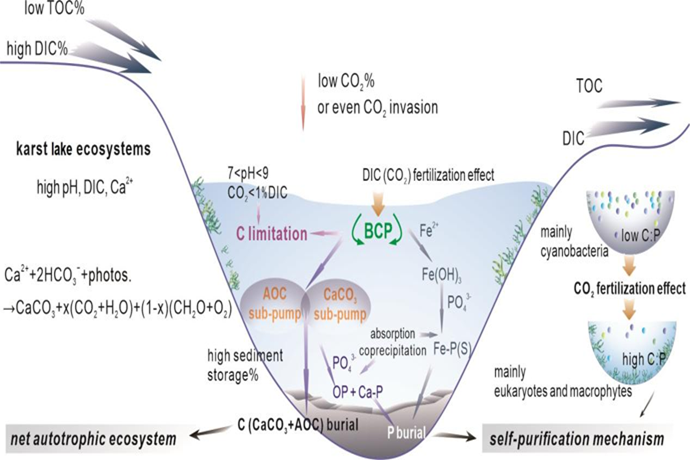While nitrogen (N) and phosphorus (P) are traditionally considered key limiting elements in eutrophication, unresolved issues persist in this field. Emerging evidence suggests that carbon (C) availability in karst lake reservoirs triggers significant ecological feedback, complementing the classical 'N+P limitation paradigm' and enriching our understanding of nutrient dynamics in aquatic ecosystems.
Based on previous research, Liu Zaihua's research group from the Institute of Geochemistry of the Chinese Academy of Sciences (IGCAS) , uncovered CO2 limits on productivity in karst lakes and reservoir systems , their impact on the structure and succession of aquatic plant communities through data integration analysis and conceptual model construction. They also proposed a P self-purification mechanism based on the biological carbon pump (BCP) effect, offering significant insights for C cycling research and cyanobacterial bloom management in the context of climate change.
The study was published in the top-tier journal Water Research in the field of environmental science and water resourceson on July 8.
Simulation and cultivation experiments indicate that dissolved CO2 limits aquatic plant community structure and succession in high pH karst systems, with C-N-P competition dynamics favoring eukaryotic phytoplankton in P competition and cyanobacteria in C-N competition, revealing new insights into community structures and biodiversity.
High pH and dissolved inorganic carbon in karst lake reservoirs lead to C limitation and CO2 fertilization, promoting efficient recycling of autochthonous organic carbon and enhanced carbonate sedimentation that removes excess phosphate. (Fig. 1).
This theoretical framework provides new insights and scientific bases for ensuring water quality safety and carbon sequestration strategies in karst lake and reservoir ecosystems.

Fig1. Conceptual Diagram of Carbon Budget Processes and Related Element (such as P) Cycling in Karst Lake Reservoir Systems(Image by IGCAS)
Contact:
Dr. HE Haibo
Institute of Geochemistry, Chinese Academy of Sciences
Email: hehaibo@mail.gyig.ac.cn
(By Prof. LIU Zaihua' s Group)